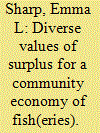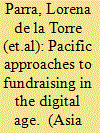|
|
|
Sort Order |
|
|
|
Items / Page
|
|
|
|
|
|
|
| Srl | Item |
| 1 |
ID:
185110


|
|
|
|
|
| Summary/Abstract |
This paper develops a diverse economies account of fish ‘waste’ that revalues it as ‘surplus’. We examine ‘Kai Ika’, a community marine conservation experiment in Tāmaki Makaurau (Auckland), Aotearoa New Zealand. Kai Ika rescues fish heads, frames and offal that were previously ‘going to waste’ and redistributes them to fish eaters who would otherwise struggle to access these foods. It involves fishers and community sector and Indigenous actors in an initiative that converts would-be waste into surplus. We examine the case as a diverse economic project that nourishes humans, enhances respect for fish as living beings, and potentially conserves marine resources in the face of global-to-local fisheries depletion. The research is based on community-gathered fish parts collection data, and virtual and email interview data. We analyse this data to produce an account of diverse ‘object values’ and fish-related surpluses that derive from surplus labour and other socio-cultural and environmental surplus. We argue that reframing fish economies in this way encourages new and diverse economic subjectivities and a more connected, relational and cooperative community economy of fish.
|
|
|
|
|
|
|
|
|
|
|
|
|
|
|
|
| 2 |
ID:
149920


|
|
|
|
|
| Summary/Abstract |
Coal dominates energy production of modern India, shaping the economic and political milieu of the country and dictating its energy future. But invisible to the state’s view of coal running the nation, are roles played by this commodity in the livelihoods of millions of poor who live on the coal tracts of the country. In this paper, I argue that there are four coal economies — with yet another one lurking within or following behind as a shadow — in India. Each of these economies has different meanings of coal to those who are involved in the economy, producing the'diverse worlds’ of coal. To substantiate my argument, I critically analyse official and field-based primary data within a'diverse economies framework’ to present the intricate interlinkages among these worlds. I show that the multiple coal worlds are neither tiered in a hierarchical manner, nor'parallel’ in the sense of dualism implied in a simplified formal-informal dichotomy. Rather, these worlds of coal have different actors, and their domains are ruled by different norms and values about the qualities of coal as a material commodity; yet they overlap and intersect with each other through their complex labour regimes.
|
|
|
|
|
|
|
|
|
|
|
|
|
|
|
|
| 3 |
ID:
192945


|
|
|
|
|
| Summary/Abstract |
The aim of this paper is to discuss how community relational economic practices in virtual spaces are effective in building resilience because they are borne of and sustained by familiar traditional Fijian values of collective work and social interdependence. The researchers adopted a pandemic-induced methodology, conducting online-based talanoa (fluid conversations between two or more people) with a number of people leading, or involved in, these initiatives. We also engaged with online community groups behind a number of initiatives. Examples are provided of online crowdfunding, livestreaming of concerts to solicit donations, and bartering facilitated by social media sites. To conclude, we stress the enduring nature of communal bonds and traditional systems which Pacific people readily adapt and translate into different forums and forms in the face of challenges such as the restrictions and financial hardships caused by COVID-19. The findings highlight that solesolevaki – a tradition of working together for a common cause – can also occur in the digital era: this demonstrates the deep connection of Fijian peoples and their sense of obligation to one another and to their culture, regardless of where they are in the world.
|
|
|
|
|
|
|
|
|
|
|
|
|
|
|
|
| 4 |
ID:
090012


|
|
|
|
|
| Publication |
2009.
|
| Summary/Abstract |
In this article, we will argue that any investigation of the 'progressive spaces of neoliberalism' needs to maintain a critical stance on the neoliberal project. In particular, we suggest that it is important to see the ways 'progressive spaces of neoliberalism' are troubled by discourses of colonisation which in turn are themselves disrupted by genealogies of Indigenous struggles. Spaces of neoliberalism are embedded in discourses of colonisation, as space is ultimately grounded in somewhere, in a 'place'. In Aotearoa, the discourses of colonisation and place are in turn entangled with a genealogy of Maori struggles to maintain and create political, economic and social structures and frameworks. These struggles are also productive, and have the potential to encourage, diverse political economies of production, trade and enterprise distinct from neoliberalism, its progressive spaces, and colonisation. We will investigate two cases to highlight that the 'messy actualities' of neoliberalism cannot be extracted from the genealogy of colonisation. Any attempts to start an analysis of progressive space as located in a neutral 'now and here' are therefore problematic.
|
|
|
|
|
|
|
|
|
|
|
|
|
|
|
|
| 5 |
ID:
185117


|
|
|
|
|
| Summary/Abstract |
Eka Nari Sanghathan (ENS), an Indigenous single women farmer's collective in Odisha, India and Norco Dairy in regional NSW, Australia are cooperatives undertaking collective action to ‘survive well’, securing agrarian livelihoods in the face of climate change. Striking differences in affluence and poverty separate these place-based cooperatives while other things connect them: an Earth unsettled by climate change and extractivist/capitalist interventions. Both cooperatives transform place in practice by engaging similar survival strategies and non-exploitative forms of cooperation. In this paper we seek to articulate the transformative nature of these places and practices in a way that goes beyond easy binaries of local/global, while enabling recognition of different affiliations between lands, related climate crisis and sustainable and shared surviving mechanisms. We develop a ‘two-thirds’ perspective building upon Bruno Latour's third attractor, the Terrestrial, together with another third, Chakrabarti, Dhar and Cullenberg's idea of the World of the Third (WOT). Their interventions open our thinking to the ecological particularities, uncertainties, and postcapitalist possibilities of surviving well in place.
|
|
|
|
|
|
|
|
|
|
|
|
|
|
|
|
| 6 |
ID:
185114


|
|
|
|
|
| Summary/Abstract |
Funders and governments alike increasingly understand the importance of women's inclusion in environmental conservation and natural resource management across the Pacific region. Despite this recognition, the weight of evidence suggests that entrenched gender inequalities continue to create barriers for women's engagement in conservation management and related projects like those for climate change adaptation. Against the dominant narrative that women are always marginal in environmental management in the Pacific, we draw on the small stories provided by women in communities around the Arnavon Islands in the Solomon Islands to show that in fact women are deeply engaged in conservation efforts and environmental care. Building on the concept of emplaced sustainability, we reframe what counts as the work of environmental conservation to include the mundane, small and everyday activities undertaken by women. Rather than marginal, the collective mundane and everyday work of women takes place alongside the ‘important’ or ‘big’ work of conservation in the region and we argue that both kinds of labouring matter for sustaining ecological livelihoods.
|
|
|
|
|
|
|
|
|
|
|
|
|
|
|
|
|
|
|
|
|